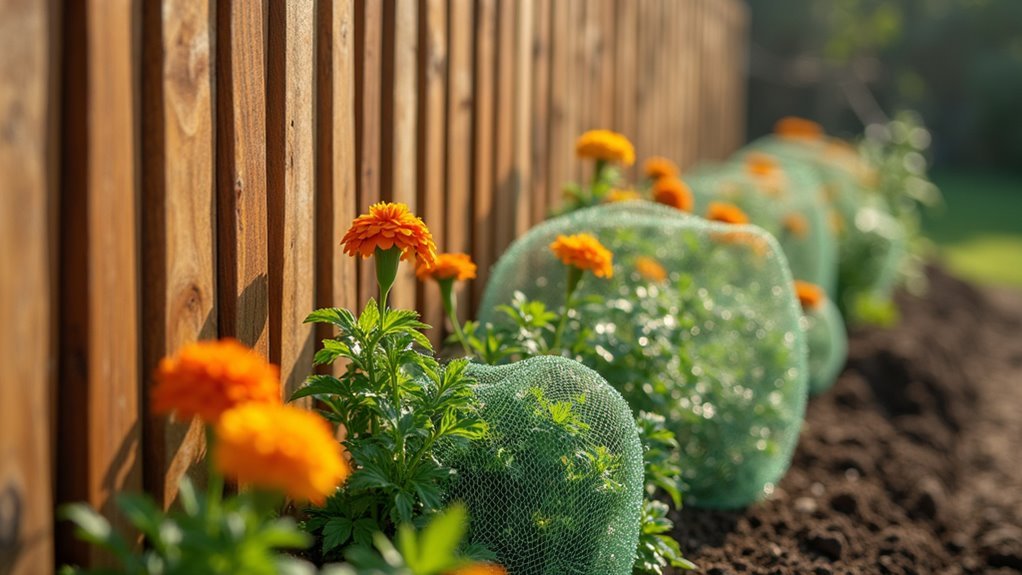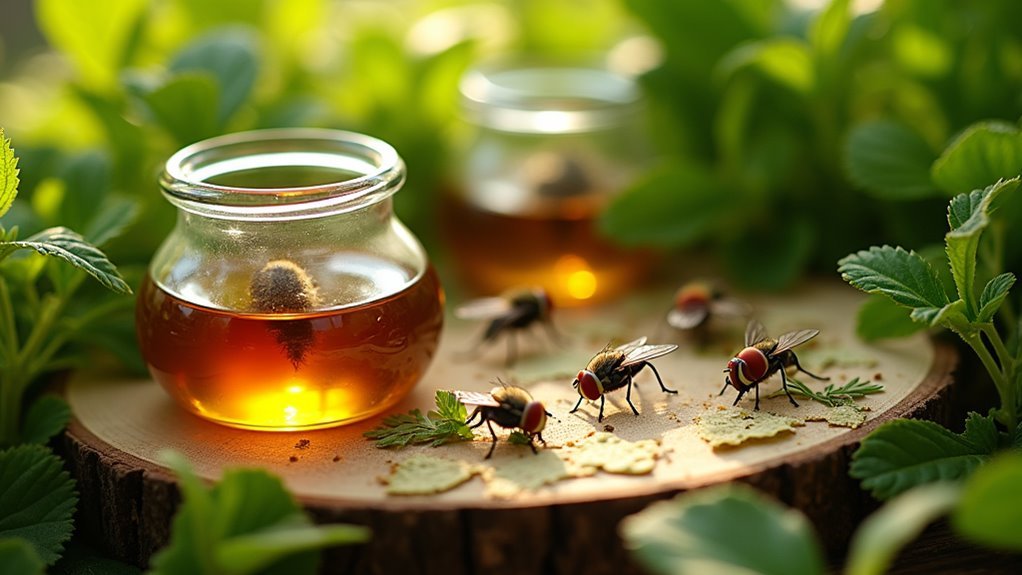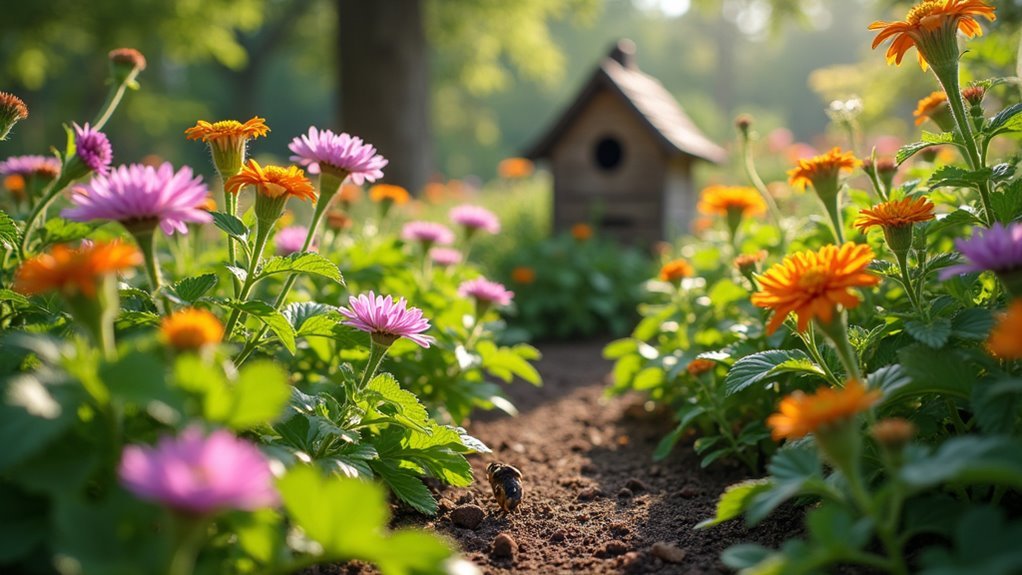You can effectively keep pests away using natural essential oils like peppermint, lavender, and eucalyptus mixed with water as DIY sprays. Plant basil, rosemary, and marigolds around your home to naturally deter insects while adding beauty to your space. Seal entry points with weatherstripping, maintain spotless kitchen cleanliness, and store food in airtight containers. Create simple vinegar traps for fruit flies and encourage beneficial insects like ladybugs. These proven methods will help you discover extensive natural pest control strategies.
Essential Oils and Natural Repellent Sprays

Homeowners seeking safer alternatives can turn to essential oils and natural repellents that effectively deter insects without introducing toxic chemicals into their living spaces.
Peppermint, lavender, and eucalyptus oils possess potent bug repelling properties that disrupt pests’ ability to locate food and shelter.
You can create an effective DIY spray by mixing 10–15 drops of essential oil with one cup of water and one tablespoon of witch hazel. This natural pest control solution repels mosquitoes, ants, and flies while remaining safe for humans and pets when used correctly.
Regular application every few days creates a protective barrier around your home. Reapply after cleaning to maintain effectiveness and enjoy chemical-free protection.
Plant-Based Deterrents for Indoor and Outdoor Spaces
Beyond sprays and liquid solutions, you can harness nature’s own defense system by strategically placing pest-repelling plants throughout your home and garden.
These plant-based deterrents offer dual benefits—they’ll repel insects while enhancing your living spaces.
Basil and rosemary work exceptionally well, as their strong scent drives away mosquitoes and flies while providing fresh herbs for cooking.
Marigolds release natural compounds that deter aphids and nematodes, making them perfect garden companions.
Lavender’s essential oil content repels fleas, moths, and mosquitoes while attracting beneficial pollinators.
For edible options, plant garlic and onions to emit sulfur compounds that ward off aphids and cabbage worms.
Container-grown mint effectively repels ants and mosquitoes—just control its spread to prevent garden invasion.
Physical Barriers and Structural Prevention Methods

You can create powerful defenses against pests by focusing on physical barriers that block their access to your home entirely.
Start by sealing every potential entry point with weatherstripping, caulking, or mesh screens, since insects can squeeze through openings as tiny as 1/8 inch.
Installing protective barriers like nets around your garden and applying diatomaceous earth around your home’s perimeter adds additional layers of protection that stop pests without toxic chemicals.
Sealing Entry Points
While chemical treatments often grab attention in pest control discussions, sealing entry points represents one of the most effective and lasting solutions for keeping unwanted insects and rodents out of your home.
You’ll want to apply weatherstripping to window and door frames, closing small gaps that serve as pest highways. Don’t forget to inspect foundations, window frames, and doorways for cracks, then seal them with non-toxic caulking.
Check your window and door screens regularly for holes or tears that compromise their effectiveness. Repair or replace damaged screens immediately to maintain barriers against flying insects.
This all-encompassing approach doesn’t just keep pests away—it also improves your home’s energy efficiency by eliminating drafts and reducing heating costs.
Protective Barriers Installation
Once you’ve sealed gaps and cracks, installing extensive protective barriers takes your defense strategy to the next level by creating multiple layers of protection against persistent pests.
Installing door sweeps and window screens physically blocks flying insects from accessing your home’s entry points, maintaining a chemical-free indoor environment. These barriers effectively prevent wasps, flies, and mosquitoes from infiltrating your living spaces.
You’ll want to focus on diatomaceous earth around your foundation and doorways, creating a natural barrier that dehydrates crawling insects while remaining completely safe for your family and pets.
This food-grade powder works by damaging insects’ exoskeletons, causing fatal dehydration. Combined with proper screening, these protective barriers form an impenetrable defense system that keeps pests out without introducing harmful chemicals into your environment.
Kitchen Cleanliness and Food Storage Strategies
Since most household pests enter kitchens searching for food and water, maintaining pristine cleanliness becomes your first line of defense against unwanted invaders.
Wipe down kitchen counters immediately after meal prep and dispose of food scraps promptly. These simple actions keep bugs away without requiring harsh chemicals. Natural oils like peppermint can enhance your cleaning routine while deterring pests.
Address moisture issues by fixing leaky faucets quickly, as standing water attracts fruit flies and other insects.
Essential Kitchen Protection Strategies:
- Store pantry items in airtight containers – Prevents access by insects and rodents while preserving food quality
- Use stick vacuums for immediate cleanup – Captures crumbs and debris after meals before pests discover them
- Clean overlooked areas regularly – Check under appliances and inside cabinets where pests often hide
Homemade Traps and DIY Solutions

You don’t need expensive commercial pesticides when your kitchen already contains powerful pest-fighting ingredients.
Simple homemade traps using vinegar can effectively capture fruit flies and wasps, while soap and oil solutions create natural insecticides that eliminate soft-bodied pests on contact.
Essential oil sprays offer another chemical-free approach, repelling various insects while keeping your home smelling fresh.
Vinegar-Based Pest Traps
Three common household vinegar types can transform your pest control approach without exposing your family to harmful chemicals.
You’ll discover that vinegar’s acidic properties naturally repel insects while creating effective traps that capture unwanted pests.
Here’s how to use vinegar-based solutions:
- Apple Cider Vinegar Fruit Fly Trap – Cover a bowl with plastic wrap and poke small holes. Flies enter but can’t escape this simple yet effective trap.
- White Vinegar Surface Cleaner – Mix equal parts vinegar and water to eliminate scent trails that attract ants and other crawling pests.
- Spider Deterrent Spray – Combine vinegar with water and spray around baseboards, corners, and entry points where spiders commonly appear.
Regular application maintains a cleaner environment while removing attractants that draw pests indoors.
Soap and Oil Solutions
Kitchen staples like dish soap and natural oils create powerful pest control solutions that outperform many commercial products. You can eliminate soft-bodied insects like aphids and spider mites by mixing liquid soap with water and spraying directly on affected areas. The soap suffocates these pests on contact.
Neem oil offers broader protection, disrupting life cycles of over 200 insect species when applied regularly. You’ll find it particularly effective against beetles, caterpillars, and leaf miners.
Essential oils work as excellent insect repellents. Mix peppermint oil with water to create a spray that deters ants and spiders naturally.
These oil-based solutions won’t harm beneficial insects when used properly, making them ideal alternatives to harsh chemical treatments.
Essential Oil Sprays
While commercial repellents contain synthetic chemicals that pose health risks, essential oil sprays deliver powerful pest control using nature’s own defenses.
These natural solutions effectively deter flies and other unwanted insects while creating a healthier environment for your family.
Essential oil sprays naturally repel various pests through their potent aromatic compounds.
You can create effective DIY solutions that are both safe and environmentally friendly.
How to Make Essential Oil Pest Control Sprays
- Peppermint or lavender spray – Mix 10-15 drops with one cup water and one tablespoon witch hazel, then apply to entry points
- Eucalyptus solution – Combine eucalyptus oil with water for repelling mosquitoes and ants around doorways and windows
- Tea tree mixture – Blend tea tree oil with water for a multi-purpose spray targeting various crawling insects
Seasonal Maintenance and Property Upkeep
As seasons change, your property’s exterior becomes either a fortress against pests or an open invitation for unwanted guests. Regular inspections of your siding, roof, and foundation help you catch damage before pests exploit these entry points.
Clean gutters and eliminate standing water sources that attract mosquitoes and other insects. Trim bushes away from your home’s perimeter and properly store outdoor furniture during off-seasons.
Before bringing seasonal decorations indoors, clean them thoroughly to avoid introducing hitchhiking pests. Seal cracks using non-toxic caulking and apply weatherstripping to doors and windows.
These natural barriers effectively block pest entry during colder months. Maintain compost piles by turning them regularly and avoiding meat or dairy waste.
Well-aerated compost helps keep pests from being attracted to decomposing organic matter.
Beneficial Insects and Natural Predator Encouragement
Beyond creating physical barriers to keep pests out, you can recruit an army of natural allies to actively hunt down unwanted insects in your garden.
Beneficial insects like ladybugs, lacewings, and predatory wasps serve as powerful natural predators that’ll dramatically reduce pest populations without chemical intervention.
Here’s how to encourage these helpful hunters:
- Create diverse habitats – Plant various flowering species and build insect hotels to provide shelter and food sources for beneficial insects.
- Practice companion planting – Grow marigolds alongside vegetables to attract predatory insects while repelling harmful pests.
- Avoid broad-spectrum pesticides – These chemicals kill beneficial insects along with pests, disrupting your garden’s natural balance.
This approach enhances biodiversity and establishes a self-sustaining ecosystem where nature handles pest control for you.
Frequently Asked Questions
What Is the Best Natural Pest Repellent?
You’ll find peppermint oil works best as a natural pest repellent. Mix it with water to create an effective spray that deters ants, mosquitoes, and flies without using harmful chemicals in your home.
What Can Be Used to Control Insect Pests Instead of Harmful Pesticides?
You can use essential oils like peppermint or eucalyptus, plant repelling herbs such as basil and marigold, apply diatomaceous earth, or encourage natural predators like ladybugs to control insects effectively.
What Is Non-Chemical Pest Control?
Non-chemical pest control uses natural methods you’ll find eco-friendly, like essential oils, companion planting, physical barriers, and proper sanitation. You’re avoiding harmful pesticides while effectively managing pests through traps and natural repellents.
How to Make Natural Pest Control?
You’ll mix essential oils with water for spraying entry points, plant basil and marigolds around your garden, create apple cider vinegar traps, maintain clean spaces, and apply diatomaceous earth near doorways.
In Summary
You’ve got plenty of natural alternatives to keep pests at bay without resorting to harsh chemicals. From essential oil sprays to strategic plant placement, physical barriers to proper food storage, these methods work together to create an unwelcoming environment for unwanted visitors. Stay consistent with your approach, maintain clean spaces, and embrace beneficial insects as allies. You’ll find that nature provides effective solutions that protect both your home and family’s health.





Leave a Reply